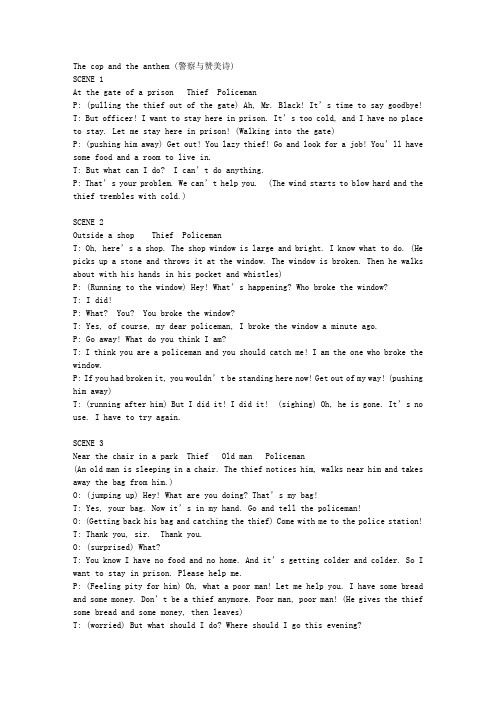警察与赞美诗 中英文剧本
欧亨利《警察与赞美诗》英文介绍

vandalism苏比走到一家陈设别致大玻璃窗惹眼的铺子前捡起鹅卵石往大玻璃上砸去然后望着旁边的警察笑警察认为没有人做了坏事会自己等着受罚所以正眼看都没看他就追着前面跑着赶车的人去了
The Book Report
The Cop and the Anthem
《警察和赞美诗》
By O.Henry
About the Author
• 3. Soapy decides to clean up his life after hearing an anthem. But alas, he is sentenced to three months in prison.
Daydreaming
苏比看见一所高级餐馆,刚 迈进餐馆的门。服务生领班的目 光就落到他的旧裤子和破皮鞋上, 然后就把他推到人行道上去了。
时髦的文雅娴静的女子在看商品。 苏比打算以一个好色之徒的身份 走过去调戏她,旁边的警察正看 着他们。想不到这位女子却转身 亲热地搂着他,说跟他走之前要 他给自己买一杯啤酒,然后苏比 在拐弯处懊丧地甩掉了女子。
警察与赞美诗 中英文剧本

The cop and the anthem (警察与赞美诗)SCENE 1At the gate of a prison Thief PolicemanP: (pulling the thief out of the gate) Ah, Mr. Black! It’s time to say goodbye! T: But officer! I want to stay here in prison. It’s too cold, and I have no place to stay. Let me stay here in prison! (Walking into the gate)P: (pushing him away) Get out! You lazy thief! Go and look for a job! You’ll have some food and a room to live in.T: But what can I do? I can’t do anything.P: That’s your problem. We can’t help you. (The wind starts to blow hard and the thief trembles with cold.)SCENE 2Outside a shop Thief PolicemanT: Oh, here’s a shop. The shop window is large and bright. I know what to do. (He picks up a stone and throws it at the window. The window is broken. Then he walks about with his hands in his pocket and whistles)P: (Running to the window) Hey! What’s happening? Who broke the window?T: I did!P: What? You? You broke the window?T: Yes, of course, my dear policeman, I broke the window a minute ago.P: Go away! What do you think I am?T: I think you are a policeman and you should catch me! I am the one who broke the window.P: If you had broken it, you wouldn’t be standing here now! Get out of my way! (pushing him away)T: (running after him) But I did it! I did it! (sighing) Oh, he is gone. It’s no use. I have to try again.SCENE 3Near the chair in a park Thief Old man Policeman(An old man is sleeping in a chair. The thief notices him, walks near him and takes away the bag from him.)O: (jumping up) Hey! What are you doing? That’s my bag!T: Yes, your bag. Now it’s in my hand. Go and tell the policeman!O: (Getting back his bag and catching the thief) Come with me to the police station! T: Thank you, sir. Thank you.O: (surprised) What?T: You know I have no food and no home. And it’s getting colder and colder. So I want to stay in prison. Please help me.P: (Feeling pity for him) Oh, what a poor man! Let me help you. I have some bread and some money. Don’t be a thief anymore. Poor man, poor man! (He gives the thief some bread and some money, then leaves)T: (worried) But what should I do? Where should I go this evening?SCENE 4In a Restaurant Thief WaitressW: Good morning, sir! T: Good morning!W: Sit down, please. Here’s the menu. What will you have?T: At first, I’d like a bowl of vegetable soup.W: (writing down) A bowl of vegetable soup.T: Then I’ll have some steak and chicken. At last, I’ll have a cup of coffee and a cigar.W: Steak, chicken, coffee and a cigar. Er, excuse me, but this is a very big meal. Do you have enough money?T: What?! What did you say? Do you often ask such questions?W: I’m sorry. I’ll bring your food right away.(Later, the thief eats up all his food)W: Was everything all right, sir?T: The food was very nice. I like it very much.W: Thank you, sir. Here’s your bill, sir. Twenty dollars, please.T: Very well, but now, I want to tell you that I haven’t twenty dollars. I don’t even have forty cents.W: I see, will you come with me, please?T: (standing up and following the waitress) Of course. The policeman is waiting for me, isn’t he?(Two men appear suddenly and walk to the thief)T: I… I… don’t understand. Who are they?)“We are the people you are waiting for!”(They give the thief a good beating.)SCENE 5In front of a church Thief Policeman Blind man(The thief stands outside of the church and listens to the music of “Silent Night”) T: What beautiful music! I often listened to it when I was a boy. Ah! How different my life is! But look at me now! What am I? Who am I? Oh, I don’t want to be a thief!I want to be a good man now. I’m not old. I’m going to work. I can help the others.(A blind man appears. The thief helps him walk across the street.)B: It’s very kind of you. (A lady drops her purse. The thief picks it up and gives it back to her.)(Later, a policeman comes)P: Hey! You! What are you doing here?T: Nothing, just listening to the music.P: Listening to the music?T: Yes, I’m just standing here and listening to the music.P: Oh, no. Didn’t I see you this morning? Of course! You are the one who was standing near that broken window. I think you broke the window after all!(The thief runs away quickly. Two other policemen run after him and catch him by thearm.T: (shouting desperately) But officer! I’ not a thief now! I don’t want to be a thief any more! I’m a good man now! I’m a good man!(The music of “silent night” echoes on the stage.)警察与赞美诗第一幕出场人物:索比 Soapy(索比急躁不安地躺在麦迪逊广场的长凳上,辗转反侧。
《警察与赞美诗》英文梗概

A New York City hobo named Soapy,who sets out to get arrested so he can avoid sleeping in the cold winter as a guest of the city jail.Soapy's ploys伎俩include swindling诈骗a restaurant into serving him an expensive meal, breaking the plate-glass window of a luxury shop, repeating his eatery exploit at a humble简陋的diner, sexually harassing a young woman, pretending to be publicly intoxicated喝醉to make troubles, and stealing another man's umbrella.However, all of these attempts are quickly exposed as failures.Based on these events, Soapy despairs of his goal of getting arrested and imprisoned.As O. Henry describes events, the small church has a working organ机构and a practicing organist风琴演奏者. As Soapy listens to the church organ play an anthem圣歌, he experiences a spiritual epiphany 神灵显现then he resolves决定to cease停止to be homeless, end his life as a tramp afflicted苦恼with unemployment, and regain his self-respect.As Soapy stands on the street and considers the plan for his future, however, a policeman taps him on the shoulder and asks him what he is doing. When Soapy answers “Nothing,” his fate issealed未知: he has been arrested for loitering闲荡. In the magistrate’s法官court on the following day, he is convicted定罪of a misdemeanor行为不端and is sentenced to three monthsin Blackwell's Island, the New York City jail.。
警察与赞美诗 英文读书报告

《警察与赞美诗》读书报告The Cop And The Anthem was just a very short novel I read in the middle school. I have no memory of this classical novel except its ridiculous ending, which the writer, O Henry ’s best at.By accident,professor Zhong reminds me of the novel in his class. It’s real lucky I think of this novel when I have to finish a reading report this week, especially in autumn. It’s getting colder and colder, so winter is near.The Cop And The Anthem is a story that happened in a cold winter. Soapy is a vagrant who is homeless and jobless. Because of the coming bad weather, he may live uneasily outside and there is a comfortable and warm place for him, Blackwell prison. For years the hospitable Blackwell prison had been his winter refuge.Three months of assured board and bed and good company, safe from north winds and policemen, seemed to Soapy the most desirable thing. Soapy had made his arrangements for his annual journey to the island. He committed crime on purpose so that he can be put into prison in winter. However, things didn't go as he expected. But when he made up his mind to give up evil and return to good, he was arrested.That funny ending impressed me very much. At first, I shew great sympathy to this poor man. He had to put himself into the prison, where his freedom was limited, in order to live himself. But after he stirred up trouble for six times and still didn’t get arrested, he was put into the once dreamed prison because he wanted to be a good man. It’s an entirely incredible ending, but it also became the highlight of this novel. O. Henry's short stories are famous for their surprise endings, his wit, wordplay and humor. And where there is humor, there always is specific implication.His black humor is present in various places from this short novel. Soapy, the vagrant who had committed a crime for six times, was eager to go to prison. But he was always out of luck and got policeman's forgiveness. When Soapy was touched by the anthem and decided to be a good citizen, he was arrested for groundless reasons. This comparison between Soapy’s before and after expresses the social reality profoundly. Although I can’t help laughing when I read this surprise ending, I also feel pity for his miserable life. This kind of black humor not only appears in the ending, it’s used in lots of plots of this novel and often make a contrary to my expectation.Soapy stole an umbrella from well-dressed man when he had expected the umbrella’s owner could send him into the prison. But the umbrella also didn’t belong to that neatly dressed man,anupper class gentleman who had a beautiful appearance. When he sang drunken songs at the top of his voice, danced, and howled on the sidewalk. The policeman mistook him into one of Yale lads celebrating their victory of football game over the Hartford College.He thought Soapy was only noisy but no harm. The funniest one is, when he molested a beautiful lady in front of a policeman, the lady joyfully answered his flirtation. The gentleman and lady who had beautiful appearances, even the policemen all expose one dirty and unrational society to us. It’s a fact beyond our imagination that the noble upper class may hide their dirty heart under good appearance. This sick society caused many poor people’s present like Soapy. But it’s these people that easily could be touched and moved by the simple anthem and decided to give up the evil and be a good man. They were so kind but regarded to be abnormal when they behave peaceful outside the church.O.Henry uses a number of comparison and black humor to fully display the character's wretched fate and cruelty of capitalist society. He is famous for short novels that are skillful with these writing techniques and is also good at describing American society. The story in this novel ironize and reveal the realistic of New York’s society at that times. That ridiculous play happened in a cold late autumn, like now. Hope this winter won’t be so cold because of people’s warm heart.。
警察与赞美诗中英文对照1

警察与赞美诗过冬计划 苏⽐躺在麦迪⽣⼴场他那条长凳上,辗转反侧。
每当雁群在夜空引吭⾼鸣,每当没有海豹⽪⼤⾐的⼥⼈跟丈夫亲热起来,每当苏⽐躺在街⼼公园长凳上辗转反侧,这时候,你就知道冬天迫在眉睫了。
⼀张枯叶飘落在苏⽐的膝头。
这是杰克?弗洛斯特的名⽚。
杰克对麦迪⽣⼴场的⽼住户很客⽓,每年光临之前,总要先打个招呼。
他在⼗字街头把名⽚递给“露天公寓”的门公佬“北风”,好让房客们有所准备。
苏⽐明⽩,为了抵御寒冬,由他亲⾃出马组织⼀个单⼈财务委员会的时候到了。
为此,他在长凳上辗转反侧,不能⼊寐。
苏⽐的冬居计划并不过奢。
他没打算去地中海游⼷,也不想去晒南⽅令⼈昏昏欲睡的太阳,更没考虑到维苏威湾去漂流。
他衷⼼企求的仅仅是去岛上度过三个⽉。
整整三个⽉不愁⾷宿,伙伴们意⽓相投,再没有“北风”⽼⼉和警察⽼爷来纠缠不清,在苏⽐看来,⼈⽣的乐趣也莫过于此了。
多年来,好客的布莱克威尔岛监狱⼀直是他的冬季寓所。
正如福⽓⽐他好的纽约⼈每年冬天要买票去棕榈滩和⾥维埃拉⼀样,苏⽐也不免要为⼀年⼀度的“冬狩”作些最必要的安排。
现在,时候到了。
昨天晚上,他躺在古⽼的⼴场喷泉和近的长凳上,把三份星期天的厚报纸塞在上⾐⾥,盖在脚踝和膝头上,都没有能挡住寒⽓。
这就使苏⽐的脑海⾥迅速⽽鲜明地浮现出岛⼦的影⼦。
他瞧不起慈善事业名下对地⽅上穷⼈所作的布施。
在苏⽐眼⾥,法律⽐救济仁慈得多。
他可去的地⽅多的是,有市政府办的,有救济机关办的,在那些地⽅他都能混吃混住。
当然,⽣活不能算是奢侈。
可是对苏⽐这样⼀个灵魂⾼傲的⼈来说,施舍的办法是⾏不通的。
从慈善机构⼿⾥每得到⼀点点好处,钱固然不必花,却得付出精神上的屈辱来回报。
真是凡事有利必有弊,要睡慈善单位的床铺,先得让⼈押去洗上⼀个澡;要吃他⼀块⾯包,还得先⼀五⼀⼗交代清个⼈的历史。
因此,还是当法律的客⼈来得强。
法律虽然铁⾯⽆私,照章办事,⾄少没那么不知趣,会去⼲涉⼀位⼤爷的私事。
既然已经打定主意去岛上,苏⽐⽴刻准备实现⾃⼰的计划。
警察与赞美诗PPT(美短)

中国联通
9:42 AM
Background
However, the spread of Marxism brought big shocks to the American society. Some authors, influenced by the workers' movement, were attracted by the Socialist ideal and took part in the workers’ movement by themselves
O.Henry is an American writer of short stories, best known for his ironic plots twists and surprising endings.
O. Henry
Chekhov
Maupassant
中国联通
9:42 AM
Early times
中国联通
9:42 AM
PLOT
All his attempts fail, he passed by a church and heard the Sabbath anthem(安息日赞美诗 安息日赞美诗).The 安息日赞美诗 influences about the old church wrought a sudden(猛然间) and wonderful change in (猛然间) his soul. Soapy decided that on the very next day he would seek out this potential mentor 良师) (良师)and applied for employment(谋职) (谋职)
警察与赞美诗剧本71页PPT

16、自己选择的路、跪着也要把它走 完。 17、一般情况下)不想三年以后的事, 只想现 在的事 。现在 有成就 ,以后 才能更 辉煌。
18、敢于向黑暗宣战的人,心里必须 充满光 明。 19、学习的关键--重复。
20、懦弱的人只会裹足不前,莽撞的 人只能 引为烧 身,只 有真正 勇敢的 人才能 所向披 靡。
31、只有永远躺在泥坑里的人,才不会再掉进坑Байду номын сангаас。——黑格尔 32、希望的灯一旦熄灭,生活刹那间变成了一片黑暗。——普列姆昌德 33、希望是人生的乳母。——科策布 34、形成天才的决定因素应该是勤奋。——郭沫若 35、学到很多东西的诀窍,就是一下子不要学很多。——洛克
《警察和赞美诗》(整理版) (1)

从一个侧面反映了美国下层 人民的生活和扭曲的心灵。显示 了法律在现实生活中的窘迫和宗 教对人的感化作用。告诉人们在 任何社会人都 需要精神的寄托。
12
为非作歹竟无人过问, 有心从善却关进牢门。
4. 根据故事情节将小说分为哪四部分?
故事开端(1-6)苏贝为逃脱严冬的威胁,策划着 冬居的计划。 故事发展(7-38)苏贝屡次惹是生非,都没有达到 被捕入狱的目的。 故事高潮(39-47)苏贝良心发现,突然被捕。 故事结局(48)苏贝被判监禁三个月。
课堂学习
分析第一部分(1-6)
苏贝躺在麦迪逊广场的长凳上,辗转反侧。当夜晚雁群引吭高 鸣,当没有海豹皮大衣的女人对她们的丈夫亲热起来,或者当苏贝 躺在广场的长凳上辗转反侧的时候,你就知道冬季已经逼近了。
一片枯叶飘落到苏贝的膝头。那是杰克·弗洛斯特的名片。杰 克对麦迪逊广场的老房客倒是体贴入微的,每年要来之前,总是预 先通知。他在十字街头把他的名片交给 “北风” ——“幕天席地 别墅”的门房——这样露天的居民就可以有所准备。
当苏比决心重新做人时,按常理应该有一个好的结局, 然而作品却安排苏比被判入狱。这样的结局便是欧亨· 利式的结尾,谈谈你对这种结尾的认识。(4分) 震撼人心。 反映社会冷酷现实,具有真实感。 悲剧的审美效应。 情节大起大落,曲折,出人意料之外又在意料之中。
课堂小结
《警察与赞美诗》是美国短篇小说家欧亨利短 篇小说的代表作,作者以辛酸讽刺的笔调,从一个 流浪汉的悲惨遭遇提出了美国社会普遍存在的一个 尖锐的问题——何为幸福和苦难,什么是恶行和善 良?课文真实的反映了当时美国社会是非颠倒、黑 白混淆的客观现实。
逮捕(dài)
憎恶 (zēng wù ) 泥淖(nào )
别墅(shù)
- 1、下载文档前请自行甄别文档内容的完整性,平台不提供额外的编辑、内容补充、找答案等附加服务。
- 2、"仅部分预览"的文档,不可在线预览部分如存在完整性等问题,可反馈申请退款(可完整预览的文档不适用该条件!)。
- 3、如文档侵犯您的权益,请联系客服反馈,我们会尽快为您处理(人工客服工作时间:9:00-18:30)。
The cop and the anthem (警察与赞美诗)SCENE 1At the gate of a prison Thief PolicemanP: (pulling the thief out of the gate) Ah, Mr. Black! It’s time to say goodbye! T: But officer! I want to stay here in prison. It’s too cold, and I have no place to stay. Let me stay here in prison! (Walking into the gate)P: (pushing him away) Get out! You lazy thief! Go and look for a job! You’ll have some food and a room to live in.T: But what can I do? I can’t do anything.P: That’s your problem. We can’t help you. (The wind starts to blow hard and the thief trembles with cold.)SCENE 2Outside a shop Thief PolicemanT: Oh, here’s a shop. The shop window is large and bright. I know what to do. (He picks up a stone and throws it at the window. The window is broken. Then he walks about with his hands in his pocket and whistles)P: (Running to the window) Hey! What’s happening? Who broke the window?T: I did!P: What? You? You broke the window?T: Yes, of course, my dear policeman, I broke the window a minute ago.P: Go away! What do you think I am?T: I think you are a policeman and you should catch me! I am the one who broke the window.P: If you had broken it, you wouldn’t be standing here now! Get out of my way! (pushing him away)T: (running after him) But I did it! I did it! (sighing) Oh, he is gone. It’s no use. I have to try again.SCENE 3Near the chair in a park Thief Old man Policeman(An old man is sleeping in a chair. The thief notices him, walks near him and takes away the bag from him.)O: (jumping up) Hey! What are you doing? That’s my bag!T: Yes, your bag. Now it’s in my hand. Go and tell the policeman!O: (Getting back his bag and catching the thief) Come with me to the police station! T: Thank you, sir. Thank you.O: (surprised) What?T: You know I have no food and no home. And it’s getting colder and colder. So I want to stay in prison. Please help me.P: (Feeling pity for him) Oh, what a poor man! Let me help you. I have some bread and some money. Don’t be a thief anymore. Poor man, poor man! (He gives the thief some bread and some money, then leaves)T: (worried) But what should I do? Where should I go this evening?SCENE 4In a Restaurant Thief WaitressW: Good morning, sir! T: Good morning!W: Sit down, please. Here’s the menu. What will you have?T: At first, I’d like a bowl of vegetable soup.W: (writing down) A bowl of vegetable soup.T: Then I’ll have some steak and chicken. At last, I’ll have a cup of coffee and a cigar.W: Steak, chicken, coffee and a cigar. Er, excuse me, but this is a very big meal. Do you have enough money?T: What?! What did you say? Do you often ask such questions?W: I’m sorry. I’ll bring your food right away.(Later, the thief eats up all his food)W: Was everything all right, sir?T: The food was very nice. I like it very much.W: Thank you, sir. Here’s your bill, sir. Twenty dollars, please.T: Very well, but now, I want to tell you that I haven’t twenty dollars. I don’t even have forty cents.W: I see, will you come with me, please?T: (standing up and following the waitress) Of course. The policeman is waiting for me, isn’t he?(Two men appear suddenly and walk to the thief)T: I… I… don’t understand. Who are they?)“We are the people you are waiting for!”(They give the thief a good beating.)SCENE 5In front of a church Thief Policeman Blind man(The thief stands outside of the church and listens to the music of “Silent Night”) T: What beautiful music! I often listened to it when I was a boy. Ah! How different my life is! But look at me now! What am I? Who am I? Oh, I don’t want to be a thief!I want to be a good man now. I’m not old. I’m going to work. I can help the others.(A blind man appears. The thief helps him walk across the street.)B: It’s very kind of you. (A lady drops her purse. The thief picks it up and gives it back to her.)(Later, a policeman comes)P: Hey! You! What are you doing here?T: Nothing, just listening to the music.P: Listening to the music?T: Yes, I’m just standing here and listening to the music.P: Oh, no. Didn’t I see you this morning? Of course! You are the one who was standing near that broken window. I think you broke the window after all!(The thief runs away quickly. Two other policemen run after him and catch him by thearm.T: (shouting desperately) But officer! I’ not a thief now! I don’t want to be a thief any more! I’m a good man now! I’m a good man!(The music of “silent night” echoes on the stage.)警察与赞美诗第一幕出场人物:索比 Soapy(索比急躁不安地躺在麦迪逊广场的长凳上,辗转反侧。
